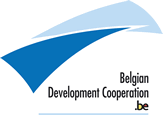The Carter Center Health and Peace Programs appreciate the continued support of our foundation, government, and corporate donors and are pleased to highlight their contributions in these regular Web features.

Government of Belgium
Feartured May 2009
The Government of Belgium is an essential partner in the The Carter Center's mission to wage peace around the world, having contributed over US$1.2 million to the Center's work. These funds allowed the Center to monitor elections in Nepal and The Democratic Republic of the Congo (DRC). Belgian funds were also critical to the Center's post-election work in the DRC on human rights and the efficient and equitable management of natural resources.
As the largest country in central Africa, the DRC has key strategic and geographical importance for the stability of the region. Six neighboring countries were directly involved in its long, bloody civil war in which an estimated four million people perished. With the signing of a peace agreement in 2002, the DRC embarked on a transition to democratic governance. In the run-up to the 2006 elections, the Center established a presence in Kinshasa and launched the Election Assistance in the Democratic Republic of Congo project. The Center played a pivotal role in monitoring those national elections. The project's election observation and conflict mediation work supported Congolese efforts to consolidate a sustainable and peaceful democracy throughout the DRC.
Since the 2006 elections, The Carter Center's work in the DRC has centered human rights and access to social, legal, and economic justice. Belgian support was particularly critical to The Carter Center's efforts to promote greater transparency, efficiency, and equity in DRC's natural resource sector. Better natural resource management is critical to economic justice. The degree to which citizens have access to economic justice in a resource-rich country like the DRC is in turn a fundamental driver for access to legal and social justice. More equitable use of DRC's natural resource wealth is thus essential to political progress and human rights.
The resulting Review of Mining Contracts project began in 2007, after the new Minister of Mines announced the creation of the Inter-Ministerial Commission (IMC) to review mining contracts between private companies and the state or public enterprises. Carter Center involvement in this process was welcomed. The project sought to advance the fair and public review of mining contracts, ensure that the contract review stresses objectivity, transparency, inclusiveness, and the highest international standards of legal and professional competence, and enhance trust in the process and the outcomes, particularly in helping to create an environment for reform with the support of civil society, investors, and government.
This work funded by the Government of Belgium, along with broader justice sector and civil society strengthening initiatives, yielded significant outcomes for human rights justice sector reform. During this period, The Carter Center:
This program was successfully concluded at the end of 2008, and The Carter Center's Human Rights Program is now rolling out a new two-year strategy that builds on these accomplishments. The next phase of activity integrates and expands all Carter Center activities in the DRC through our Human Rights House in order to meet the goal of: Advancing human rights through access to social, legal, and economic justice in the Democratic Republic of the Congo. This approach, focusing on human and citizen's rights, is being fine-tuned with the Belgian Government, other donors, and international partners who share our interests in and commitment to the DRC.
Belgian funding was also instrumental in helping Nepal achieve a peaceful democratic transition through free and fair elections. The Carter Center launched the Nepal Electoral and Political Monitoring project in early 2007, following an invitation from the Government of Nepal, several major political parties, and the Communist Party of Nepal (Maoist). When Nov. 22, 2007 Constituent Assembly elections were cancelled, key national political actors and the international community urged the Center to remain engaged in Nepal's peace process. Two further postponements followed before Nepal's Constituent Assembly election was finally held on April 10, 2008. The election was peaceful and considered broadly successful by Nepalese and the international community. Nepal was officially declared a federal democratic republic by a simple majority vote at the first sitting of the CA on May 28, 2008.
Nepal continues to face challenges as it moves forward. It needs to consolidate peace and strengthen democratic institutions with a focus on the security sector. It must also ensure the genuine inclusion of marginalized groups and curb impunity. Nepalese political actors and the international community have again encouraged The Carter Center to maintain its presence and involvement in Nepal to support the work of the constituent assembly and the peace process. They have unanimously stated an appreciation for the Center's past work and a desire for our continued activity, particularly through President Carter's personal support and visits to Nepal. They have also noted the reputation the Center enjoys as a respected and impartial monitoring organization with a strong grassroots network throughout the country. In all of these areas, Nepal can continue to count on the effective support of the international community.
The people of Nepal and the Democratic Republic of the Congo have benefited significantly, and will continue to benefit, from these projects. Our work would not have been possible without funding from the Government of Belgium. As a country committed to achieving the Millennium Development Goals by 2015, Belgium has demonstrated its dedication to human rights and democracy worldwide through its partnership with The Carter Center.
Please sign up below for important news about the work of The Carter Center and special event invitations.
Learn more about the Center's work in the Democratic Republic of the Congo and Nepal
Learn more about the Carter Center's Human Rights Program